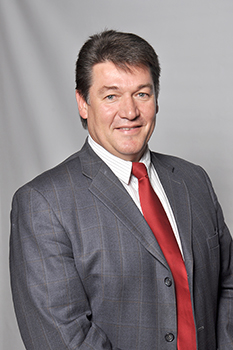
Christo Dippenaar, former Kovsie
and current UFS councillor.
Photo: Johann Roux
Christo Dippenaar knows the University of the Free State (UFS) very well. He started his studies at the UFS in 1992 and later obtained a BProc degree. During his years at university, he was Prime of Hendrik Verwoerd Residence (1994), served on the Student Representative Council in the portfolio Men Intern (1995), and in the following year he was Deputy President of the Student Representative Council. He was also residence head of the former Reitz Apartments.
A thorough knowledge of the university
Thanks to this broad background, he has a thorough knowledge of the university, its history, procedures, principles and its people. It is therefore no surprise that Dippenaar was elected to the Council by UFS alumni. Dippenaar, or “Dippies” as he is also known, has served on the Council since 2014. In addition, he has a child who is currently studying at the UFS and therefore he has more than just a theoretical interest in what is happening at the UFS.
He is of the opinion that, in his capacity as UFS councillor, he could be a true mouthpiece for former Kovsies.
"As councillor, I can ask the necessary questions to ensure fair and just treatment of all stakeholders."
A man with diverse interests
His legal knowledge also comes in handy in his role as councillor. Dippenaar was formerly employed at Honey Attorneys and at Horn and Van Rensburg, but in 2008 he started his own practice which is also operating in Lesotho.
He describes his wife, Hanlie, as his best friend and soul mate. His eldest son, Johann, is studying BSc Quantity Surveying at the UFS, while another son, Pieter, is in Grade 10 in Grey College. His daughter, Anneke, is in Grade 6 in Universitas Primary.
Asked about his passions, he says rugby and fine Brahman cross-breed cattle are equally attractive to him. Thus, a man with diverse interests and a highly demanding career, but also a former Kovsie with a passion for other former Kovsies and for his alma mater.